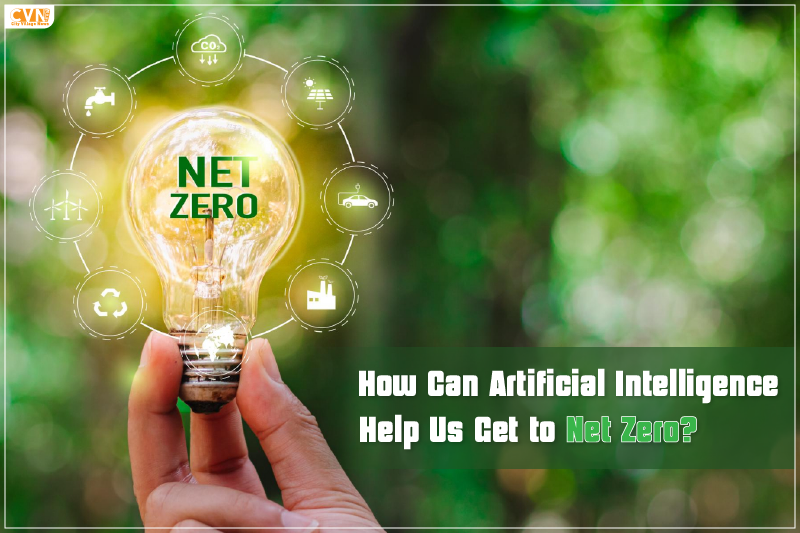Artificial intelligence (AI) has emerged as a powerful tool in addressing the global challenge of achieving net-zero emissions. With its ability to process vast amounts of data and make complex calculations, AI is revolutionizing various sectors and paving the way for innovative solutions to combat climate change. If you are wondering how can artificial intelligence help us get to net zero, continue reading.
Let’s explore how AI can play a crucial role in our journey towards a sustainable future.
Enhancing Energy Efficiency
AI algorithms can optimize energy consumption by analyzing patterns, identifying inefficiencies, and suggesting improvements. Smart grids powered by artificial intelligence can monitor and manage energy distribution, reducing waste and increasing overall efficiency. Additionally, AI-powered sensors and control systems can optimize energy usage in buildings, transportation, and industrial processes, significantly reducing carbon footprints.
Revolutionizing Renewable Energy
AI can maximize the potential of renewable energy sources like solar and wind. AI algorithms can effectively optimize the utilization of renewable energy systems by analyzing weather patterns, demand forecasts, and grid conditions. This ensures efficient power generation, storage, and distribution, reducing reliance on fossil fuels and accelerating the transition to clean energy.
Enabling Smart Transportation
You must be thinking how can artificial intelligence help us get to net zero with smart transportation? Here’s your answer. AI can revolutionize transportation by enabling autonomous vehicles and optimizing traffic management. Self-driving cars powered by AI algorithms can reduce fuel consumption and emissions by minimizing traffic congestion and adopting efficient driving patterns. AI can also enhance public transportation systems, optimizing routes, schedules, and vehicle utilization, thereby reducing energy consumption and emissions.
Also Read: Benefits of Sustainable Tourism and How You Can Make a Change
Precision Agriculture
AI-powered technologies, such as remote sensing and machine learning, can revolutionize agriculture practices. By analyzing soil conditions, weather patterns, and crop health data, AI algorithms can optimize irrigation, fertilization, and pest control, reducing the use of water, chemicals, and energy. Precision agriculture techniques can enhance crop yields while minimizing environmental impacts.
Climate Modeling and Prediction
AI can analyze vast amounts of climate data, enabling accurate climate modeling and prediction. This helps scientists and policymakers understand the impact of various interventions and make informed decisions. AI-powered climate models can simulate different scenarios, evaluate mitigation strategies, and guide policymakers in formulating effective climate policies.
Carbon Capture and Storage
AI can aid in the development and optimization of carbon capture and storage (CCS) technologies. By analyzing data from CCS facilities and geological formations, AI algorithms can enhance the efficiency and cost-effectiveness of capturing and storing carbon dioxide emissions from industrial processes and power plants.
Behavioral Change and Decision Support
AI can influence individual behavior towards sustainable practices. AI-powered platforms can provide personalized recommendations and incentives for adopting eco-friendly habits, such as energy conservation, waste reduction, and sustainable consumption. AI can also provide decision support tools for businesses, policymakers, and individuals, helping them make sustainable choices and align their actions with climate goals.
Climate Risk Assessment and Adaptation
AI can assist in assessing and mitigating climate risks. By analyzing data from various sources, including satellite imagery and sensors, AI algorithms can identify vulnerable areas, predict climate-related hazards, and support adaptation strategies. AI can enable early warning systems, facilitate disaster response, and enhance resilience to climate change impacts.
How AI is advancing the energy transition to net-zero?
AI is playing a crucial role in advancing the energy transition to net-zero. It helps optimize renewable energy generation, enhance grid efficiency, and enable smart energy management. AI algorithms analyze vast amounts of data to improve energy forecasting, grid stability, and demand response. Additionally, AI-powered technologies like energy storage and smart meters contribute to efficient energy use. With AI’s assistance, we can accelerate the shift towards sustainable and clean energy sources, paving the way for a greener future.
Also Read: Aviation & Automobile to Work Together in Providing Sustainable Travel Solutions
Artificial Intelligence and Net Zero in Aviation Industry
Artificial Intelligence (AI) is revolutionizing the aviation industry’s journey towards achieving net-zero emissions. AI-powered algorithms optimize both domestic and international flights routes, reducing fuel consumption and emissions. Smart systems analyze real-time data to improve operational efficiency and reduce waste. AI also aids in aircraft maintenance, predicting and preventing issues to enhance safety and reduce downtime. Furthermore, artificial intelligence assists in the development of sustainable aviation fuels and electric aircraft, reducing reliance on fossil fuels. With AI’s integration, the aviation industry is making significant strides towards a greener future, working towards the ambitious goal of achieving net-zero emissions.
Artificial intelligence holds immense potential in helping us achieve net-zero emissions and combat climate change. By optimizing energy systems, revolutionizing renewable energy, enabling smart transportation and agriculture, facilitating climate modeling, supporting carbon capture, promoting behavioral change, and enhancing climate risk assessment, AI can drive transformative change towards a sustainable and resilient future. Embracing AI technologies and fostering collaboration between stakeholders are vital steps in harnessing the power of AI for a greener world.
Now you know how can artificial intelligence help us get to net zero. Comment below and let us know what are your opinions about AI transforming all the sectors around the world.
| Disclaimer: City Village News claims no credit for the images featured on its blog site. All the visual content is copyrighted to its respective owners only. We mention the source name of the picture whenever possible and found. However, please get in touch with us if we miss acknowledging the owner’s source. In case the owners don’t want us to use their images, we will remove them promptly. We believe in providing proper attribution to the original author, artist, and photographer. |

